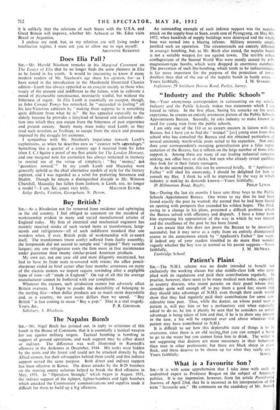Does Elia Pall ?
SIR,—Mr. Harold Nicolson remarks in his Marginal Comment on The Essays of Elia that he no longer finds the same pleasure in Elia as he found in his youth. It would be interesting to know if many modern readers of Mr. Nicolson's age share his opinion, for—as I have noted in the intrcduction to the Macdonald Illustrated Classics edition—Lamb has always appealed as an essayist mainly to those who, weary of the present and indifferent to the future, wish to cultivate a mood of pleasurable reminiscence, necessarily wistful, but without the bitterness of regret. In Elia Lamb is essentially an escapist, though, as John Cowper Powys has remarked, he " succeeded in fooling " all his late-Victorian admirers by " making them suppose he is something quite different from what he is." He has appealed especially to the elderly because he provides a fairyland of leisured and cultured reflec-
- tion into which they can escape from the bitterness of past experience and present anxiety. Surely many must today read Lamb, as they read such novelists as Trollope, to escape from the strain and pressure imposed by the struggle for existence.
I sympathise with Mr. Nicolson's impatience towards Lamb's euphemisms, as when he describes ears as " exterior twtn appendages." Something like a quarter of a century ago I received from Sir John (then J. C.) Squire a proof of my first article for The London Mercury, and one marginal note for correction has always remained in memory to remind me of the virtue of simplicity " Say ` money,' not pecuniary reward.' " In my youth Lamb and Macaulay were generally upheld as the chief alternative models of style for the literary aspirant, and I was regarded as a rebel for preferring Stevenson and Hazlitt. Though he retains a distinguished disciple in Mr. Winston Churchill, Macaulay has fallen from fashion; is Lamb, too, no longer










































 Previous page
Previous page